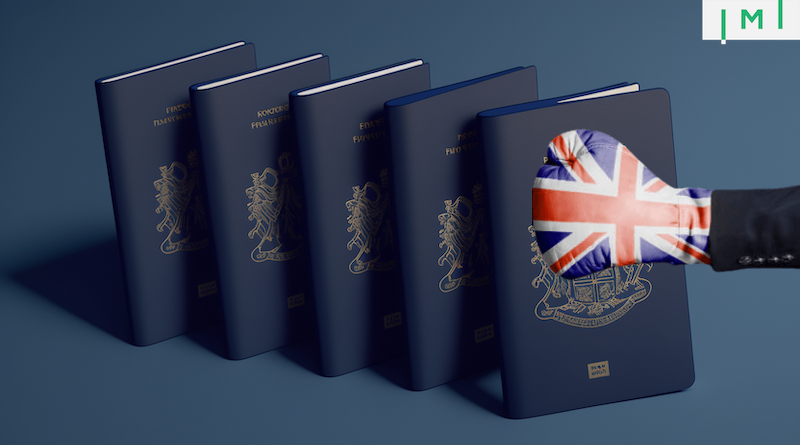Is the UK About to Push Over the First Domino Leading to the End of Small-Country CIPs?
Reasonable Doubt
With David Lesperance
A contrarian expert on contingency plans for the wealthy delivers uncomfortable truths.
One truism for success that I was taught in my youth was “anticipate the predictable.” This guiding principle immediately kicked in when I read a series of articles in the UK mainstream press this past week. Specifically, on Tuesday, April 11th, The Times headlined a story titled “Chinese spies buying citizenship to third countries and slipping into UK”. The Daily Mail and other journalists picked up on The Times article the very next day.
The main thrust of the articles was that Chinese spies are gaining entry to Britain after obtaining citizenship in countries that allow visa-free travel to the UK. As a result, The Home Office was preparing new visa restrictions on countries that were offering Citizenship by Investment.
There was some reported pushback from the Foreign Office, which wanted to continue to allow visa-free travel for tourists from these countries as part of efforts to improve relations. In contrast, the Home Office believes its request should be prioritized because it involves national security concerns. A government source told The Times that “the Home Office and Foreign Office are fighting this one out. It keeps happening. One won’t budge without concessions from the other, and we can’t seem to resolve it.”
Whether or not the allegations regarding espionage are accurate is irrelevant as the perception that it is true is now out in the open. For voters and, in turn, politicians, “perception is reality.” So, with this allegation in the public eye, what is the predictable outcome?
Here is my analysis of the current situation and the predictable sequence of future events:
- Since countries with Residence by Investment programs have a long naturalization period, the “other countries” seems to obviously be referring to CBI countries. This is borne out by specific reference in The Times article to Vanuatu’s program;
- Home Office or MI5 officials passed on this information to the Secretary of State for Foreign Commonwealth and Development Affairs, James Cleverly, and Home Office Minister Suella Braverman but feel that they have not acted appropriately on this intelligence; and
- Officials were distressed enough by the inaction to take the extraordinary step of leaking this intelligence to the press to light a fire under the current UK government.
What’s next? The UK Parliament reconvenes on Monday, April 17th, and will be in session until the May Day Recess on April 27th. Will Prime Minister Sunak, or Ministers Braverman or Cleverly, be asked about this situation during Question Period? Will the UK government extinguish this potentially politically damaging controversy by stripping all the CBI countries of UK visa-free travel?
The answer lies in whether the current UK government wants to be seen by the voting public to deal with Chinese espionage threats rather than maintaining current relations with these small CBI countries.
While I am not a UK pollster, as a keen observer of UK politics, I would venture to speculate that there is a high likelihood that the various Caribbean and Vanuatu CBI offerings will see UK visa-free travel stripped away in the near future. Furthermore, I would go on to predict that, given the EU’s entrenched antagonism against CBI programs and its authority over the administrative operation of the Schengen Agreement, this action by the UK will then give coverage to also strip Schengen visa-free travel from these CBI countries.
If my predictions become a reality and the UK domino tips, which are likely to be the subsequent dominos to fall?
First, we should recognize that those who have or will be wealthy enough to have already purchased citizenship through a CIP will probably not have difficulty paying a visa service a few hundred dollars to secure a UK or Schengen visa. In short, one generally doesn’t spend one’s last $150,000 on a second citizenship. Therefore, those who previously purchased citizenship will probably not have any difficulty acquiring a visa (unless they have criminal or espionage issues!).
However, this group should also be aware that when they go through the process of renewing their passports, they may have to go through a new security screening. This is exactly what happened in Grenada after 9/11. Existing CBI citizens seeking to renew their Grenada passports had to undergo another major security check and pay a hefty fee.
While refusing to issue a new passport is undoubtedly within the power of issuing countries, the actual stripping of citizenship involves legal processes that are unique to each country. However, those who choose not to go through a second security review or who fail such a review will find themselves still citizens, but without a current travel document.
What is more significant for the future of CBI programs in a given country is the reality of average local citizens. They will be burdened with the expense and hassle of getting visas in the future. These local citizens are voters who will weigh the indirect positives of a CBI program against the very real negative direct impacts on their lives.
This political reality recently reared its head in dramatic fashion in Portugal and Ireland, where politicians responded to populist voter sentiment by announcing major changes restricting or even closing their residence by investment programs.
It is worth remembering that almost all the CBI countries that currently enjoy visa-waiver agreements with the UK are very small countries. The largest CBI country, Turkey, does not have UK visa-free travel. Being small, foreign direct investment through a CBI program can have a dramatic and visible impact on the life of locals. The real question for the future of CBI programs in a given country would depend on whether the majority of voters conclude that the pros continue to outweigh the con of loss of UK and Schengen visa-free travel.
Only time will tell.
David Lesperance is a global leader of international tax and immigration advisors.
A published author in the field, his personal interest in these areas of law grew from his experience working as Canadian immigration and customs officer while studying law. Since being called to the bar in 1990, he has established his expertise with major law firms, his own law firm and as a private consultant. David has successfully advised scores of high and ultra high net-worth individuals and their families, many of whom continue to seek his counsel today. In addition he has provided pro bono advice to many governments on how to improve their Citizenship by Investment, Residence by Investment or Golden Visa type programs to better meet the needs of his global clients. David is supported by a team of professionals, some of whom have worked with him since the early 1990s.




